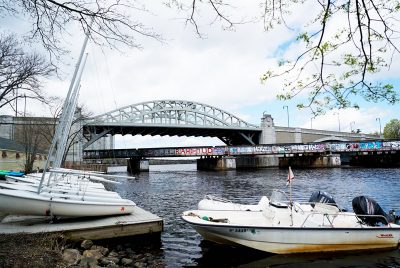
Massachusetts State Police removed an encampment for unhoused individuals close to the Boston University Bridge during a snowstorm Jan. 27.
The sweep was one of many that has affected this particular community, according to an Instagram post uploaded by Act on Mass Regional Organizer Calla Walsh, in which she described what she witnessed.
“Our unhoused community members have lived here for years after being pushed out of Harvard/Central Square,” she wrote, “and the staties and [Boston Public Works] have repeatedly swept their encampments, traumatized the people living there, and destroyed their belongings.”
The post included photos of BPW vehicles and workers — some of whom Walsh wrote were not wearing masks — at the street entrance to the site.
She spoke to an unmasked BPW worker who confirmed to her they were removing tents and other belongings during the snowstorm, according to the post.
“Despite knowing that the unhoused people were likely to return tonight,” Walsh wrote, “and despite having nowhere else to relocate them.”
BU spokesperson Colin Riley wrote in an email the BU Police Department was not involved in the sweep itself, although there were some individuals without homes who have recently been “trespass-warned from BU property.”
He added some of these individuals carried “significant criminal records,” including level three sex offenses as well as bike and other property thefts from university students and staff.
“I hope you can appreciate that the University’s highest priority is the safety and security of the members of the BU Community,” Riley wrote.
David Procopio, director of media communications for the Massachusetts State Police, wrote in an email the department recognizes the issue of homelessness is complex.
“As a Department,” he wrote, “we aim to treat members of the homeless community with compassion and understanding, and make it a priority to offer services.”
However, Procopio added this must be weighed alongside protecting the public in addition to the residents of these encampments.
“We have to balance their desire to remain in a public area with any laws that prohibit it and with any threats the encampment may pose to their own safety or the safety of others,” Procopio wrote.
He noted the area of the encampment is regularly visited by officials due to health hazards such as open fires and unsanitary conditions.
“We always issue a warning prior to the day when we visit to allow residents of the encampment to leave on their own,” Precopio said. “For those who have chosen to stay despite the earlier warning, we try not to dispose of any property of value.”
Cassie Hurd, executive director of the state’s local Material Aid and Advocacy Program said the timing of the removal was “both cruel and unjust,” particularly because the camp’s residents were allegedly not warned despite Precopio’s statement.
“Typically people receive advanced notice, this happens very regularly at that encampment, these sort of police [actions],” Hurd said. “They refer to them as engagements and cleanups under the guise of sanitation and public health.”
She said she spoke with one of the municipal workers who told her the sweep had been previously scheduled but no notice had been given.
MAAP’s mission is “to support and empower community members experiencing homelessness or living in poverty, through material aid, access to resources, and advocacy opportunities.”
Hurd said the organization was working on providing those affected with aid such as “tents, tarps, sleeping bags, cold weather supplies, food and things like that.”
She wrote in an email residents who were not present “lost all of their belongings,” including some that were necessary for survival.
“Much of these have been replaced by MAAP and other small grassroots and community organizations,” Hurd wrote, “however, many items are irreplaceable, such as those of sentimental value, or cannot be easily replaced, such as personal identification.”
College of Arts and Sciences freshman Keegan Mitsuoka said she thought the removal had “terrible timing” especially amid the COVID-19 pandemic and cold weather conditions.
Oscar Martinez, a College of General Studies freshman, said he sympathises with the residents of the encampment.
“I feel bad for them,” Martinez said. “They need somewhere for them to shelter.”
He noted a better option would be for the Massachusetts Police and BPW to provide those who are unhoused with other options, such as a “camp for relocation” similar to a shelter.
Hurd wrote in an email the Commonwealth of Massachusetts must end its practice of criminalizing unhoused community members.
“Stop the harassment, surveillance, move along orders, arrests, and other practices that criminalize people for openly surviving and living in poverty and affirm the rights of people who are unhoused,” Hurd wrote. “There is no crime in being poor.”















































































































